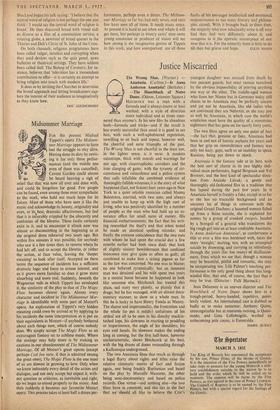Justice Miscarried
The Wrong Man. (Warner.) - Anderson Anastasia? (Berkeley.) —The Hunchback of Notre Dame. (Odeon, Leicester Square.) HITCHCOCK was a man with a formula and it always (more or less) worked; with a style of direction more individual and at times man- nered than anyone's. In his new film he abandons both—formula and tricks—and if the result is less evenly successful than usual it is good to see him, with such a well-upholstered reputation, unwilling to sit back and repeat, however well, the cheerful and eerie triumphs of the past. The Wrong Man is not cheerful in the least nor, in the lighter sense, is it eerie. A modern catastrope, thick with morals and warnings for our age, with claustrophobic corridors and the iron clanging of gates; with the tyranny of cir- cumstance and coincidence and a police system that calls infallible the combined evidence of thoroughly fallible witnesses, it is the story of what happened (fact, not fiction) four years ago in New York to a quiet reliable musician called Manny Balestrero, married, with two sons, and always just unable to keep up with the high cost of living, who was positively identified by a number of people as the man who had held up an in- surance office for small sums of money. His financial embarrassments; the fact that his writ- ing resembled the thief's and that when tested he made an identical spelling mistake; and finally the extreme coincidence that the two men with whom he had spent the crucial day a few months earlier had both since died; that look of slightly sinister bewilderment that confused innocence may give quite as often as guilt; all combined to make him a sitting pigeon as far as the law was concerned. No one was to blame; no one behaved tyrannically; but an innocent man was detained and his wife spent two years in a mental home because he happened to look like someone else. Hitchcock has treated this plain, sad story very plainly, so plainly that it drags; but he has managed, with an almost docu- mentary manner, to show us a whole man. In this he is lucky to have Henry Fonda as Manny. The shame and impersonality, the frustration and the whole (to put it mildly) unfairness of his ordeal are all to be seen in his slouchy mackin- toshed lope, his slowness in reacting to prodding or impertinence, the angle of his shoulders, his eyes and hands. Its slowness makes the ending long in coming, but the first half-hour, however uncharacteristic, shows Hitchcock at his best, with the big drums of doom resounding through a Kafkaesque underground.
The two Anastasia films that reach us through a legal flurry about rights and titles raise the relative cinematic merits of fact and fiction again, one being frankly Ruritanian and based on the play by Marcelle Maurette, the other being semi-documentary and based on police records. One virtue—and nothing else—the two films have in common; and this lies in the fact that we should all like to believe the Czar's youngest daughter was rescued from death by two peasant guards, but must remain tantalised by the obvious impossibility of proving anything one way or the other. The middle-aged woman who from her Nissen but in Germany today still claims to be Anastasia may be perfectly sincere and yet not be Anastasia, like old ladies who are convinced they are Nefertiti; or she may just as well be Anastasia, in which case the world's scepticism must have the quality of a monstrous nightmare that has gone on for nearly forty years.
The two films agree on only one point of fact —the fact that, genuine or fake, Anastasia had been in and out of lunatic asylums for years and that her grip on remembrance and fantasy was only too hazy, gaps, such as an inability to speak Russian, being put down to shock.
Anastasia is the fantasy side at its best, with the best sort of charm in its two highly indi- vidual main performers, Ingrid Bergman and Yul Brynner, and the best kind of spectacular direc- tion from Anatole Litvak; a gentle and thoroughly old-fashioned film in a tradition that has lapsed during the past few years. In it Anastasia herself is frankly a fake, except in so far as she has no traceable background and an uncanny lot of things in common with the original Grand Duchess; a haunted woman fished up from a Seine suicide, she is exploited for money by a group of crooked émigrés, headed by a Svengali of a general who transforms the big rough girl into an at least creditable Anastasia. Is Anna Anderson Anastasia?, as cumbersome a title as ever a film was burdened with, takes the story 'straight,' starting, too, with an attempted suicide by drowning, and carrying us relentlessly through the years (far too many) of disillusion- ment, from which we see that, though a woman may be beautiful, pitiful and romantic, she may be exasperating too. Lilli Palmer's touching per- formance is the only good thing about this long- winded film; that and, of course, the fact that it may be true. (Director : Falk Harnack.)
Jean Delannoy is an uneven director and The Hunchback of Notre Dame shows him in a trough-period, heavy-handed, repetitive, point- lessly violent. An international cast is dubbed so badly as to make nonsense; Anthony Quinn, unrecognisable but at moments moving, is Quasi- modo, and Gina Lollobrigida, washed an unbecoming pale cocoa, is Esmeralda.
ISABEL QUIGLY


































 Previous page
Previous page